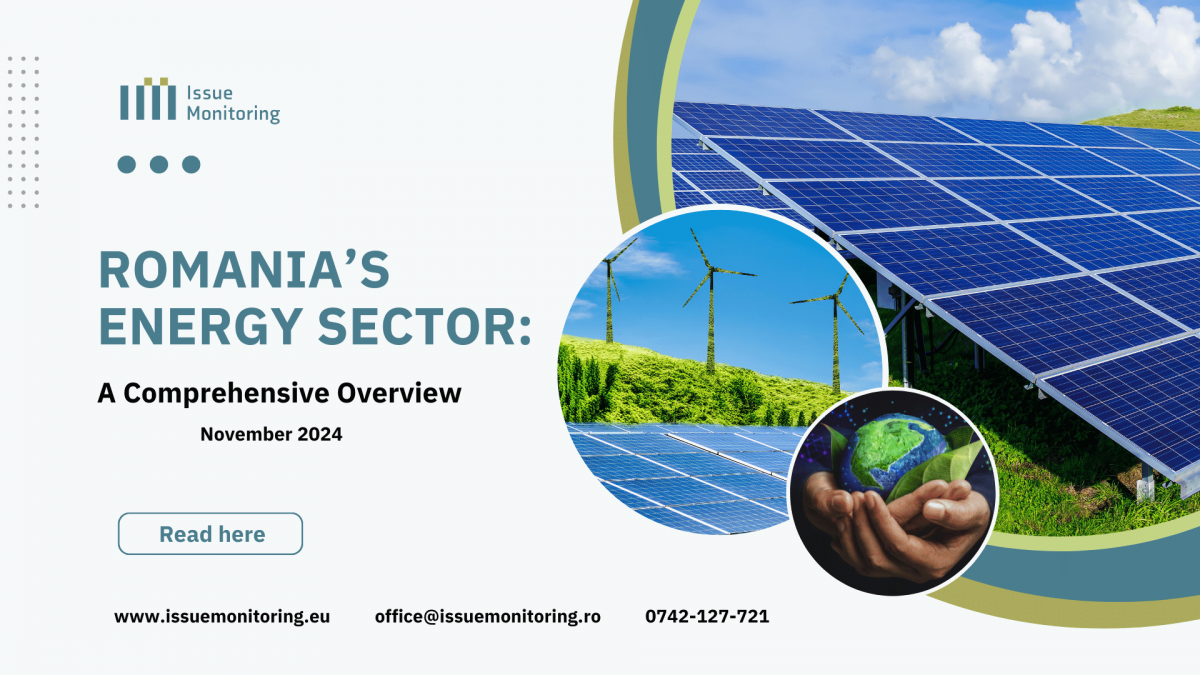
Written by Eusebiu Stamate
In November 2024, Romania took significant steps to reshape its energy landscape, focusing on renewable energy expansion, infrastructure modernization, and consumer protection. These changes reflect the country’s commitment to supporting a green transition in line with European objectives.
The Government Approves Key Strategies for Energy and Industrial Futures
The 2025–2035 Energy Strategy was approved by the Government, establishing a framework for energy security, sustainability, and economic competitiveness. The document outlines clear objectives, such as expanding renewable energy capacities, reducing greenhouse gas emissions, and promoting energy storage solutions. The strategy aligns with the National Integrated Energy and Climate Plan (PNIESC) and aims to ensure universal access to affordable energy through the integration of digital technologies for sector modernization.
In parallel, the 2024–2030 Industrial Strategy was adopted, emphasizing the modernization of the industrial sector through advanced technologies and sustainability. It encourages a circular economy and the development of green industrial sectors, such as battery production and renewable energy components. The strategy offers support measures to facilitate access to financing, boost exports, and enhance workforce training.
Initiatives for Renewable Energy and Energy Efficiency
The Ministry of Energy introduced a draft ordinance for the “Urban Up” program, aimed at supporting condominium associations in installing photovoltaic and energy storage systems. The program promotes self-consumption of renewable energy and energy efficiency, contributing to emission reductions.
Another draft ordinance proposes the National Support Program for Heavy Industry (PNSMI), allocating €1 billion for electrification and the adoption of renewable hydrogen in production processes. The program is funded by revenues from greenhouse gas emissions certificate auctions and targets energy-intensive sectors.
Key Legislative Updates
At the legislative level, the Chamber of Deputies approved an amendment to Emergency Ordinance No. 78/2024, clarifying fiscal rules for gas exploration in the Black Sea. The project has been sent to the President for promulgation.
In the Senate, a legislative initiative proposed by Deputy Cristian Ciubuc aims to amend laws governing extravilan agricultural lands. The proposal allows for combining agricultural production with renewable energy projects on orchards, vineyards, and pastures, subject to obtaining necessary authorizations. This initiative supports sustainable land management and investments in renewable energy.
Modernization of Energy Infrastructure
The National Energy Regulatory Authority (ANRE) proposed updates to the National Gas Transport System Code, unifying entry and exit contracts into a single annual framework. The GMOIS platform will digitalize processes, reducing bureaucracy and improving operational efficiency.
ANRE also published the 2024–2033 National Gas Transport System Development Plan, which includes €4.72 billion in investments for network expansion and internal infrastructure improvements.
For the electricity network, the 2024–2033 Electric Transmission Network Development Plan, prepared by Transelectrica, outlines investments to integrate renewable energy sources and ensure stable energy flow from production to consumption. The proposed upgrades aim to reduce interruptions and improve service quality.
Consumer Protection and Support for Vulnerable Households
The Government established the Interministerial Committee for Protecting Vulnerable Consumers and Combating Energy Poverty, a consultative body proposing measures to assist households affected by energy poverty.
Additionally, the Ministry of Energy published a draft ordinance updating Emergency Ordinance No. 166/2022, providing financial support of up to 750 RON for vulnerable households to install heat distributors.
Impact of Constitutional Court Decisions
The Constitutional Court declared the surcharge on electricity producers unconstitutional, stating that it violated the principle of fair taxation and economic freedom. The Ministry of Energy announced plans to analyze the decision’s implications for current regulations to ensure market stability and consumer protection.
Conclusion
November 2024 marked significant measures in Romania’s energy sector, from long-term strategies and major infrastructure investments to green transition support and consumer protection. These initiatives underline the country’s determination to advance toward a sustainable and resilient future.
Issue Monitoring continues to support professionals in the field with real-time alerts and detailed analyses, helping them navigate these legislative changes.
At Issue Monitoring, we send real-time alerts and detailed analyses to help you navigate these legislative changes effectively. If you’d like to learn more about how Issue Monitoring can help you monitor legislation efficiently, don’t hesitate to reach out to us! 🤝


